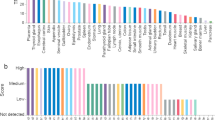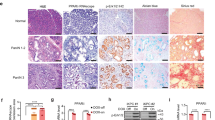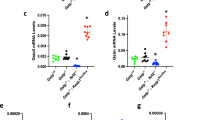Abstract
We treated Apcmin mice, which are predisposed to intestinal polyposis, with a selective synthetic agonist of peroxisome proliferator–activated receptor-δ (PPAR-δ). Exposure of Apcmin mice to the PPAR-δ ligand GW501516 resulted in a significant increase in the number and size of intestinal polyps. The most prominent effect was on polyp size; mice treated with the PPAR-δ activator had a fivefold increase in the number of polyps larger than 2 mm. Our results implicate PPAR-δ in the regulation of intestinal adenoma growth.
This is a preview of subscription content, access via your institution
Access options
Subscribe to this journal
Receive 12 print issues and online access
$209.00 per year
only $17.42 per issue
Buy this article
- Purchase on Springer Link
- Instant access to full article PDF
Prices may be subject to local taxes which are calculated during checkout

Similar content being viewed by others
References
Willson, T.M., Brown, P.J., Sternbach, D.D. & Henke, B.R. J. Med. Chem. 43, 527–550 (2000).
Lim, H. et al. Genes Dev. 13, 1561–1574 (1999).
Barak, Y. et al. Proc. Natl. Acad. Sci. USA 99, 303–308 (2002).
Tan, N.S. et al. Genes Dev. 15, 3263–3277 (2001).
Michalik, L. et al. J. Cell Biol. 154, 799–814 (2001).
Wang, Y.X. et al. Cell 113, 159–170 (2003).
Lee, C.H. et al. Science 302, 453–457 (2003).
Gupta, R.A. et al. Proc. Natl. Acad. Sci. USA 97, 13275–13280 (2000).
He, T.C., Chan, T.A., Vogelstein, B. & Kinzler, K.W. Cell 99, 335–345 (1999).
Park, B.H., Vogelstein, B. & Kinzler, K.W. Proc. Natl. Acad. Sci. USA 98, 2598–2603 (2001).
Oliver, W.R. et al. Proc. Natl. Acad. Sci. USA 98, 5306–5311 (2001).
Saez, E. et al. Nat. Med. 4, 1058–1061 (1998).
Lefebvre, A.M. et al. Nat. Med. 4, 1053–1057 (1998).
Kim, E.C. & Lance, P. Gastroenterol. Clin. North Am. 26, 1–17 (1997).
Acknowledgements
Mice were housed in accordance with institutional and NIH guidelines. This work is supported in part by US Public Health Services grants RO1DK 47279 and P0-CA-77839 to R.N.D. and HD 33994 to S.K.D. R.N.D. is a Hortense B. Ingram Professor of Molecular Oncology. R.N.D. (R37-DK47297) and S.K.D. (R37-HD12304) are recipients of National Institutes of Health MERIT awards. We thank the T.J. Martell Foundation and the National Colorectal Cancer Research Alliance for their generous support to R.N.D. Histological analysis was performed by K. Washington (pathologist).
Author information
Authors and Affiliations
Corresponding author
Ethics declarations
Competing interests
The authors declare no competing financial interests.
Rights and permissions
About this article
Cite this article
Gupta, R., Wang, D., Katkuri, S. et al. Activation of nuclear hormone receptor peroxisome proliferator–activated receptor-δ accelerates intestinal adenoma growth. Nat Med 10, 245–247 (2004). https://doi.org/10.1038/nm993
Received:
Accepted:
Published:
Issue Date:
DOI: https://doi.org/10.1038/nm993
This article is cited by
-
Cellular and Molecular Regulation of Exercise—A Neuronal Perspective
Cellular and Molecular Neurobiology (2023)
-
Ligand-activated PPARδ expression promotes hepatocellular carcinoma progression by regulating the PI3K-AKT signaling pathway
Journal of Translational Medicine (2022)
-
Rapid acceleration of KRAS-mutant pancreatic carcinogenesis via remodeling of tumor immune microenvironment by PPARδ
Nature Communications (2022)
-
Exercise adaptations: molecular mechanisms and potential targets for therapeutic benefit
Nature Reviews Endocrinology (2020)
-
Discovering highly selective and diverse PPAR-delta agonists by ligand based machine learning and structural modeling
Scientific Reports (2019)



